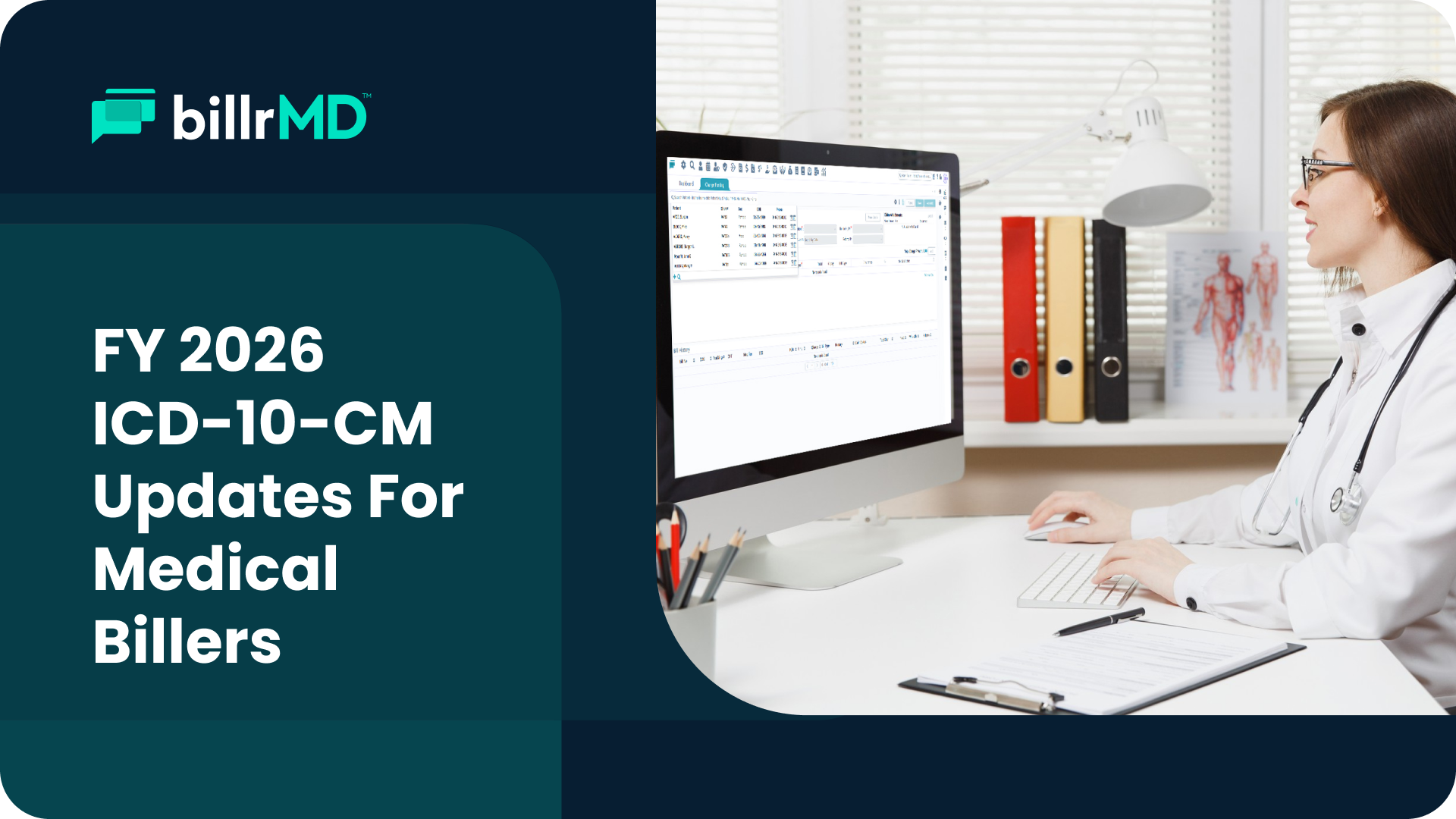Avoid Medical Coding Errors with the Right Software

Billing and coding errors in healthcare happen more often than many practices realize, and the financial impact adds up fast. A Becker’s Hospital Review report suggested that healthcare billing errors affect up to 80% of medical claims, with billions lost annually due to denials, underpayments, or rejected claims.
And it’s not just about money. Medical coding errors can erode patient trust, trigger compliance issues, and create administrative headaches that overwhelm both front-office and billing teams.
But here’s the good news: Many of these common coding and billing mistakes are entirely preventable. With the right medical billing software in place, your team can catch errors before they reach the payer.
Integrated solutions like billrMD provide real-time checks, alerts, and automation to help ensure cleaner claims from the outset. By aligning accurate processes with up-to-date coding and intelligent software support, practices like yours can improve efficiency, reduce denials, and strengthen revenue cycle performance.
Let’s take a closer look at the top billing and coding mistakes that delay payments and uncover the best ways to fix billing mistakes in medical practices.
Mistake #1: Coding Without Cross-Checking Updated Guidelines
Medical coding is constantly evolving, and using outdated ICD or CPT codes remains a leading claim denial reason. Even a single outdated code can trigger a rejection, leading to delayed reimbursements, extra administrative effort to correct and resubmit, and increased risk of medical billing compliance issues.
The billrMD Solution:
billrMD automatically syncs with the latest coding updates. With real-time code validation and automatic CPT/ICD updates, it alerts users about outdated or invalid entries before submission, ensuring every claim is aligned with current coding standards.
Mistake #2: Incomplete or Incorrect Patient Demographics
A misspelled name, missing policy number, or incorrect date of birth might seem minor, but these small medical billing mistakes can cause significant delays in getting claims approved. Payers routinely deny claims with incomplete or mismatched patient information, regardless of how accurate the coding is.
The billrMD Solution:
Our practice management and medical billing software comes with smart intake fields and real-time validation to catch errors in patient names, insurance IDs, and other key fields before claims are created.
Mistake #3: Modifier Misuse or Omission
Modifiers provide essential context about a procedure, like whether it was distinct, bilateral, or part of a bundled service. Coding documentation issues, such as using the wrong modifier or leaving one out entirely, can misrepresent the service and result in reduced or denied reimbursement, even when everything was done correctly.
The billrMD Solution:
billrMD automatically flags medical coding errors, which include missing or incorrect modifiers, during claim creation. Built-in suggestions guide coders toward appropriate selections, while real-time alerts prompt corrections before submission, helping ensure complete and accurate claims.
Mistake #4: Submitting Duplicate Claims
Duplicate claims often occur unintentionally, whether from miscommunication, system errors, or attempts to correct a previous submission. But even well-meaning resubmissions can raise red flags with payers, who may flag them as suspicious activity. This can lead to delayed payments, denied reimbursement, or even trigger a medical billing compliance review.
The billrMD Solution:
Real-time alerts can help staff catch and correct duplicate entries before claims are submitted. By flagging possible duplicates early, our healthcare billing software reduces unnecessary resubmissions, protects against payment delays, and keeps your claims clean and compliant.
Mistake #5: Filing Claims After Payer Deadlines
Every payer, from Medicare to private insurers, has firm deadlines for claim submissions. Missing those deadlines often results in automatic denials, no matter how accurate the claim or how necessary the services were.
The billrMD Solution:
Our medical billing software provides timely filing alerts and batch submission tools that help your team stay ahead of deadlines. This is especially helpful for those with high-volume practices.
Mistake #6: Manual Payment Posting Errors
Entering payments manually may seem manageable, but it significantly increases the chance of misapplied payments, duplicate entries, or inaccurate posting. These payment posting errors can distort A/R reports, create patient billing confusion, and force your staff to spend additional time reconciling accounts.
The billrMD Solution:
Our software supports automated payment posting and electronic remittance advice (ERA) reconciliation. By minimizing manual entry, practices can ensure payments are applied accurately and efficiently, improving both financial accuracy and patient trust.
Mistake #7: Skipping Insurance Eligibility Verification
Providing services without first verifying insurance coverage is a common billing error, often happening during high-volume intake or when relying on old information. Claims may be denied due to inactive policies or non-covered services, resulting in uncollectible balances and unhappy patients facing unexpected bills.
The billrMD Solution:
billrMD offers real-time insurance eligibility checks at the point of intake. With just a few clicks, staff can confirm active coverage before services are scheduled, helping prevent medical billing errors that lead to claim denials.
Mistake #8: Missing Required Documentation
Many services, especially high-cost or specialty procedures, require supporting documents such as progress notes, referrals, or prior authorizations. Submitting claims without these essentials can delay processing, trigger manual reviews, and lead to lengthy appeals or lost revenue.
The billrMD Solution:
Our EHR-integrated medical billing software allows easy upload and attachment of documentation directly to each claim. This helps ensure payers receive complete submissions the first time, improving approval rates and reducing back-and-forth.
Mistake #9: Ignoring Payer-Specific Billing Rules
Billing rules can vary widely from one payer to another. Failing to customize submissions to meet specific requirements, such as modifier use, diagnosis order, or frequency limits, can lead to unnecessary denials. Noncompliance with payer rules increases denial rates, prolongs resolution times, and adds strain to your billing team’s workload.
The billrMD Solution:
billrMD includes a payer-specific rules engine and customizable claim scrubbing features. These tools validate claims against payer guidelines before submission, helping teams get it right the first time.
Mistake #10: Insufficient Billing Team Training
Billing regulations and payer requirements are subject to frequent changes. Without continuous training and support, even experienced staff can fall behind, repeat old mistakes, or miss important updates. Repeated billing and coding errors in healthcare lead to denied claims, workflow slowdowns, staff frustration, and ultimately, revenue loss.
The billrMD Solution:
billrMD supports your team with real-time alerts, intuitive navigation, and in-app guidance that helps users catch and correct errors as they work, minimizing mistakes and building team confidence over time.
Catch Coding Errors Before They Cost You with billrMD’s Medical Billing Software
Medical billing mistakes are more than a minor nuisance — they can significantly affect your revenue, compliance, and patient trust. Whether it's medical coding errors or missing documentation, each billing mistake adds cost, complexity, and administrative burden to your practice.
But you don’t have to wait for problems to arise before taking action. With a system like billrMD, your practice gains the tools to prevent errors before they happen. Our platform combines automation, real-time validation, payer-specific rules, and a user-friendly design to streamline your billing process from end to end.
Don’t let preventable errors slow your growth. Get started with billrMD today and take the guesswork out of your medical billing process.
Frequently Asked Questions
How does billrMD support medical billing compliance with federal and payer-specific regulations?
billrMD includes built-in compliance safeguards, payer-specific logic, and customizable alerts to help practices meet HIPAA requirements and individual payer policies.
Can we migrate billing data from our current EHR or medical billing software into billrMD?
Yes. Our team assists with secure data migration, ensuring key patient, billing, and payer information is accurately transferred with minimal downtime.
Do we need to pause billing operations during the transition?
Not necessarily. We structure onboarding to minimize disruptions so your billing cycle continues uninterrupted during setup and training.
Who do we contact if we encounter issues after going live?
You’ll have direct access to our support team for troubleshooting, user guidance, and technical help even after implementation is complete.













